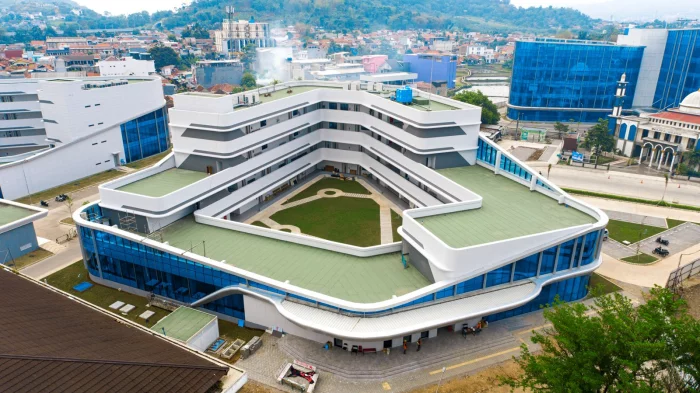Faculty of Science and Informatics
Faculty of Science and Informatics at Universitas Jenderal Achmad Yani (FSI UNJANI) stands as a beacon of excellence in science and informatics education. With a rich history, a commitment to quality education, and a focus on research and community engagement, FSI UNJANI continues to produce competent professionals who contribute significantly to advancements in science and technology, both nationally and globally.
Description
More Products & Services
People
Description
Faculty of Science and Informatics (FSI) at Universitas Jenderal Achmad Yani (UNJANI) is a distinguished academic entity committed to advancing education and research in the realms of science and information technology. Tracing its origins to 1987, the faculty was initially established as the School of Mathematics and Natural Sciences (STMIPA). In 1990, it transitioned into the Faculty of Mathematics and Natural Sciences (FMIPA), reflecting a broader academic scope. Recognizing the evolving landscape of science and technology, the faculty underwent a significant transformation in 2017, adopting its current designation as the Faculty of Science and Informatics (FSI).
Throughout its evolution, Faculty of Science and Informatics has remained steadfast in its mission to provide high-quality education, foster innovative research, and contribute meaningfully to community development. The faculty emphasizes a curriculum that integrates theoretical foundations with practical applications, ensuring that graduates are well-equipped to navigate and contribute to the dynamic fields of science and informatics.
Faculty of Science and Informatics offers a diverse array of undergraduate and graduate programs, each meticulously designed to cultivate expertise in their respective disciplines:
Undergraduate Programs (S1):
- Chemistry
- Informatics
- Information Systems
Graduate Program (S2):
- Master of Chemistry
Each program is structured to provide a comprehensive educational experience, blending theoretical knowledge with hands-on practice. The curriculum is continually updated to align with industry advancements and technological innovations, ensuring that students acquire relevant and up-to-date competencies.
FSI UNJANI envisions itself as a leading faculty in the domains of science and informatics, recognized for its commitment to excellence in education, cutting-edge research, and community engagement.
Vision:
To become a faculty of high repute, offering internationally competitive education in science and informatics, while upholding the values of national identity and environmental stewardship.
Mission:
- Delivering quality education that harmoniously integrates theoretical insights with practical applications in science and informatics.
- Promoting knowledge advancement through innovative and sustainable research, fostering strategic partnerships with industry and related organizations to facilitate technology transfer, applied research, and employment opportunities for graduates.
- Contributing to societal development through programs and services focused on leveraging science and informatics to address social and environmental challenges.
- Enhancing faculty management quality and competitiveness through innovations in administration, information systems, human resource development, and academic services.
Key Strengths and Advantages
Faculty of Science and Informatics distinguishes itself through several core strengths, that faculty offers a curriculum that balances theoretical foundations with practical applications, ensuring that students are well-prepared to meet industry demands and technological advancements.
Qualified Faculty Members:
Faculty of Science and Informatics boasts a team of dedicated educators and researchers with extensive expertise in their respective fields, committed to delivering high-quality education and mentorship.
Modern Facilities and Laboratories:
The faculty is equipped with state-of-the-art laboratories and facilities that support both academic learning and research initiatives, providing students with hands-on experience in real-world applications.
Industry and Research Collaborations:
Faculty of Science and Informatics actively engages in partnerships with industry players and research institutions, facilitating technology transfer, applied research opportunities, and enhancing the employability of its graduates.
Community Engagement:
The faculty is committed to utilizing science and informatics to address societal and environmental issues, implementing programs and services that benefit the broader community.
Research and Community Engagement
Faculty of Science and Informatics places a strong emphasis on research, encouraging both faculty and students to engage in innovative projects that contribute to the advancement of science and informatics. The faculty also prioritizes community engagement, implementing programs that apply scientific and technological solutions to address societal challenges, thereby enhancing the quality of life within the community.
Career Prospects for Graduates
Graduates of FSI UNJANI are well-equipped to pursue careers in various sectors, including:
- Chemical Industry:
Roles in research and development, quality control, and production management.
- Information Technology:
Positions such as software developers, system analysts, data scientists, and IT consultants.
- Education and Research:
Opportunities as educators or researchers in academic institutions or research organizations.
- Environmental Agencies:
Engagements in environmental monitoring, sustainability projects, and policy development.
The faculty's comprehensive educational approach ensures that graduates possess the necessary skills and knowledge to excel in their chosen careers and adapt to the evolving demands of the global job market.
Throughout its evolution, Faculty of Science and Informatics has remained steadfast in its mission to provide high-quality education, foster innovative research, and contribute meaningfully to community development. The faculty emphasizes a curriculum that integrates theoretical foundations with practical applications, ensuring that graduates are well-equipped to navigate and contribute to the dynamic fields of science and informatics.
Faculty of Science and Informatics offers a diverse array of undergraduate and graduate programs, each meticulously designed to cultivate expertise in their respective disciplines:
Undergraduate Programs (S1):
- Chemistry
- Informatics
- Information Systems
Graduate Program (S2):
- Master of Chemistry
Each program is structured to provide a comprehensive educational experience, blending theoretical knowledge with hands-on practice. The curriculum is continually updated to align with industry advancements and technological innovations, ensuring that students acquire relevant and up-to-date competencies.
FSI UNJANI envisions itself as a leading faculty in the domains of science and informatics, recognized for its commitment to excellence in education, cutting-edge research, and community engagement.
Vision:
To become a faculty of high repute, offering internationally competitive education in science and informatics, while upholding the values of national identity and environmental stewardship.
Mission:
- Delivering quality education that harmoniously integrates theoretical insights with practical applications in science and informatics.
- Promoting knowledge advancement through innovative and sustainable research, fostering strategic partnerships with industry and related organizations to facilitate technology transfer, applied research, and employment opportunities for graduates.
- Contributing to societal development through programs and services focused on leveraging science and informatics to address social and environmental challenges.
- Enhancing faculty management quality and competitiveness through innovations in administration, information systems, human resource development, and academic services.
Key Strengths and Advantages
Faculty of Science and Informatics distinguishes itself through several core strengths, that faculty offers a curriculum that balances theoretical foundations with practical applications, ensuring that students are well-prepared to meet industry demands and technological advancements.
Qualified Faculty Members:
Faculty of Science and Informatics boasts a team of dedicated educators and researchers with extensive expertise in their respective fields, committed to delivering high-quality education and mentorship.
Modern Facilities and Laboratories:
The faculty is equipped with state-of-the-art laboratories and facilities that support both academic learning and research initiatives, providing students with hands-on experience in real-world applications.
Industry and Research Collaborations:
Faculty of Science and Informatics actively engages in partnerships with industry players and research institutions, facilitating technology transfer, applied research opportunities, and enhancing the employability of its graduates.
Community Engagement:
The faculty is committed to utilizing science and informatics to address societal and environmental issues, implementing programs and services that benefit the broader community.
Research and Community Engagement
Faculty of Science and Informatics places a strong emphasis on research, encouraging both faculty and students to engage in innovative projects that contribute to the advancement of science and informatics. The faculty also prioritizes community engagement, implementing programs that apply scientific and technological solutions to address societal challenges, thereby enhancing the quality of life within the community.
Career Prospects for Graduates
Graduates of FSI UNJANI are well-equipped to pursue careers in various sectors, including:
- Chemical Industry:
Roles in research and development, quality control, and production management.
- Information Technology:
Positions such as software developers, system analysts, data scientists, and IT consultants.
- Education and Research:
Opportunities as educators or researchers in academic institutions or research organizations.
- Environmental Agencies:
Engagements in environmental monitoring, sustainability projects, and policy development.
The faculty's comprehensive educational approach ensures that graduates possess the necessary skills and knowledge to excel in their chosen careers and adapt to the evolving demands of the global job market.

Share
Recent Chats
Share via email
Future: handle WhatsApp here
Future: handle LinkedIn here
Future: handle Twitter here
SUBMENU HERE
Share via Chat
Copy Link




